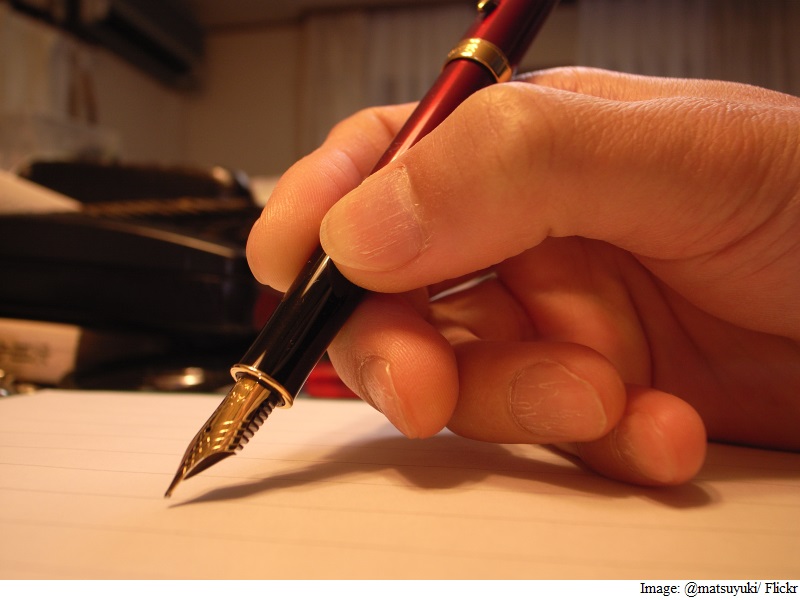- Home
- Science
- Science News
- Can a Machine Write a Sonnet That Is as Good as a Human's? We're About to Find Out
Can a Machine Write a Sonnet That Is as Good as a Human's? We're About to Find Out

Turing Tests in Creative Arts
Dartmouth CollegeSince it was devised in 1950, the Turing Test - named for Alan Turing, hero of "The Imitation Game" - has been the standard way of assessing artificial intelligence: Machines are judged on how well they exhibit intelligent behavior, usually in conversation or game-playing, that to a human listener or observer would be indistinguishable from that of a real person.
Last summer, two professors at Dartmouth College proposed an imaginative variation: the Turing Tests in Creative Arts, challenging participants to submit algorithms that can generate human-quality art.
"Specifically," Dan Rockmore (a professor of math and computer science) and Michael Casey (a professor of music and computer science) write in an essay that discusses the project, "we ask if machines are capable of generating sonnets, short stories, or dance music that is indistinguishable from human-generated works, though perhaps not yet so advanced as Shakespeare, O. Henry or Daft Punk."
The competition has three parts: DigiLit, where the test is creating a New Yorker-level short story; PoetiX, where the product must be a 14-line sonnet in iambic pentameter; and AlgoRhythms, where the computer has to create a 15-minute dance set. In all cases, the software will be given a "seed" - a verbal image in the literary contest and a single track of music for the dance. Organizers will mix the entries in with human-generated work. A panel of literary judges will be asked to figure out which poems and stories were written by machines; for the music, the judges will be dance students. A winner is any computer entry that fools the judges into thinking its creator was alive.
The results will be announced May 18 at Dartmouth's Digital Arts Exposition.
© 2016 The Washington Post
Get your daily dose of tech news, reviews, and insights, in under 80 characters on Gadgets 360 Turbo. Connect with fellow tech lovers on our Forum. Follow us on X, Facebook, WhatsApp, Threads and Google News for instant updates. Catch all the action on our YouTube channel.
Related Stories
- Samsung Galaxy Unpacked 2025
- ChatGPT
- Redmi Note 14 Pro+
- iPhone 16
- Apple Vision Pro
- Oneplus 12
- OnePlus Nord CE 3 Lite 5G
- iPhone 13
- Xiaomi 14 Pro
- Oppo Find N3
- Tecno Spark Go (2023)
- Realme V30
- Best Phones Under 25000
- Samsung Galaxy S24 Series
- Cryptocurrency
- iQoo 12
- Samsung Galaxy S24 Ultra
- Giottus
- Samsung Galaxy Z Flip 5
- Apple 'Scary Fast'
- Housefull 5
- GoPro Hero 12 Black Review
- Invincible Season 2
- JioGlass
- HD Ready TV
- Laptop Under 50000
- Smartwatch Under 10000
- Latest Mobile Phones
- Compare Phones
- OPPO A6v 5G
- OPPO A6i+ 5G
- Realme 16 5G
- Redmi Turbo 5
- Redmi Turbo 5 Max
- Moto G77
- Moto G67
- Realme P4 Power 5G
- HP HyperX Omen 15
- Acer Chromebook 311 (2026)
- Lenovo Idea Tab Plus
- Realme Pad 3
- HMD Watch P1
- HMD Watch X1
- Haier H5E Series
- Acerpure Nitro Z Series 100-inch QLED TV
- Asus ROG Ally
- Nintendo Switch Lite
- Haier 1.6 Ton 5 Star Inverter Split AC (HSU19G-MZAID5BN-INV)
- Haier 1.6 Ton 5 Star Inverter Split AC (HSU19G-MZAIM5BN-INV)

















